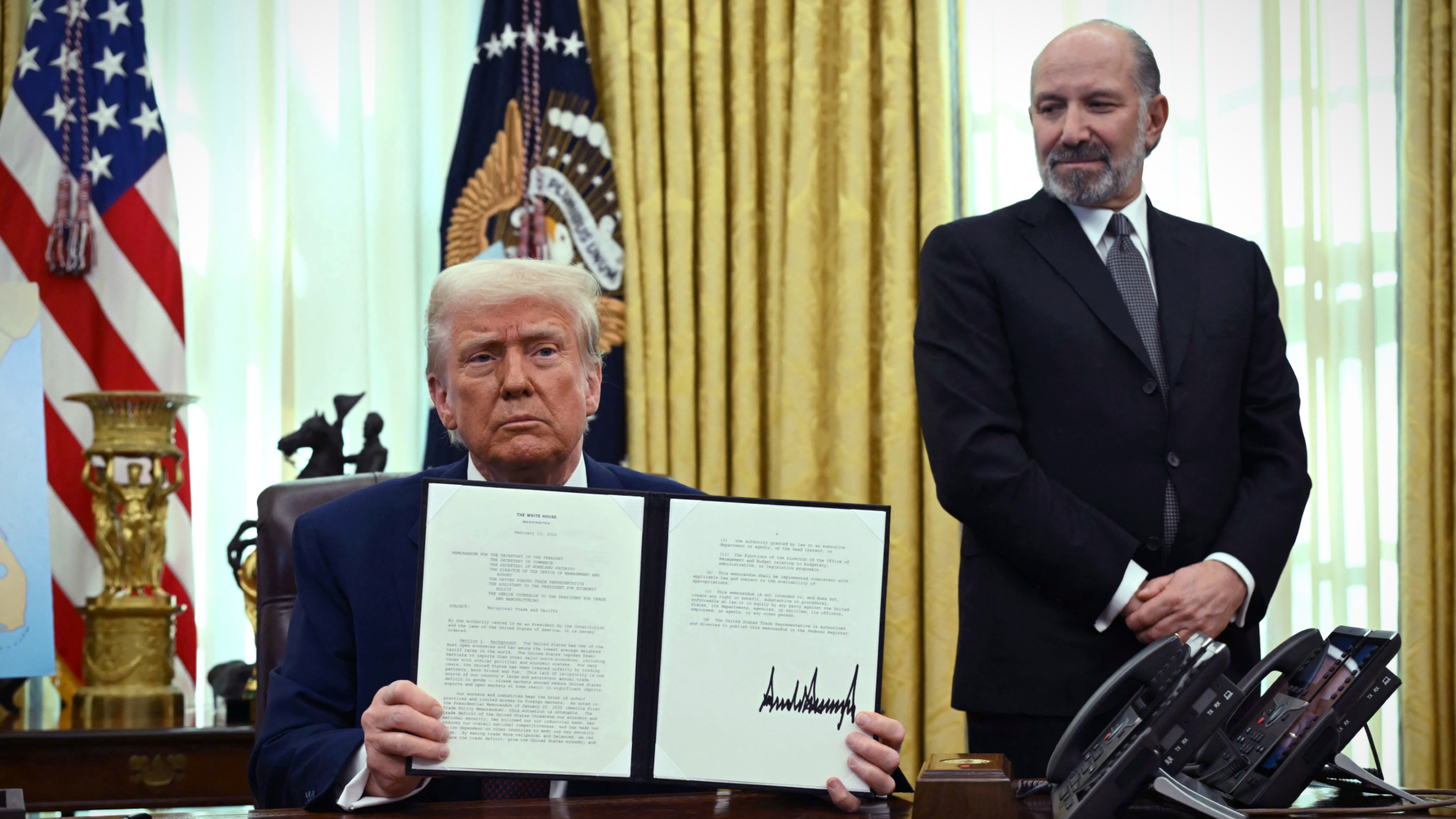Trump lays out plans for broad 'reciprocal' tariffs
Tariffs imposed on countries that are deemed to be treating the US unfairly could ignite a global trade war and worsen American inflation


A free daily email with the biggest news stories of the day – and the best features from TheWeek.com
You are now subscribed
Your newsletter sign-up was successful
What happened
President Donald Trump Thursday ordered the Commerce Department and U.S. trade representative to assess all foreign trading partners to determine "reciprocal tariffs" he would impose on countries deemed to be treating the U.S. unfairly. The review would look at tariffs other countries levy on U.S. exports plus other criteria like regulations, taxes and exchange rates.
Who said what
For the "purpose of fairness," Trump told reporters, "I will charge a reciprocal tariff, meaning whatever countries charge the United States of America, we will charge them. No more, no less." The tariffs would seek to address the wide U.S. trade deficits, a "longstanding trade irritant for the president and his economic team," The Wall Street Journal said.
They could also "ignite a global trade war and add to America's rebounding inflation problem," CNN said. "Reciprocity may sound appealing, but remember who pays tariffs: It's the American importer, and the burden eventually falls on the consumer," said Erica York of the Tax Foundation to The Washington Post. "It's like shooting yourselves in the foot because someone else is shooting themselves in the foot."
The Week
Escape your echo chamber. Get the facts behind the news, plus analysis from multiple perspectives.

Sign up for The Week's Free Newsletters
From our morning news briefing to a weekly Good News Newsletter, get the best of The Week delivered directly to your inbox.
From our morning news briefing to a weekly Good News Newsletter, get the best of The Week delivered directly to your inbox.
What next?
The studies were expected to be finished by April 1. Trump's "ambitious" individualized global tariffs "could shatter the rules of global trading," The New York Times said. "Policymakers from both parties," the Post said, have credited the "decades-long U.S. promotion of low tariffs on most items" with "giving American consumers access to inexpensive goods from all over the world." Critics say they hurt U.S. manufacturing.
A free daily email with the biggest news stories of the day – and the best features from TheWeek.com
Peter has worked as a news and culture writer and editor at The Week since the site's launch in 2008. He covers politics, world affairs, religion and cultural currents. His journalism career began as a copy editor at a financial newswire and has included editorial positions at The New York Times Magazine, Facts on File, and Oregon State University.
-
 The Olympic timekeepers keeping the Games on track
The Olympic timekeepers keeping the Games on trackUnder the Radar Swiss watchmaking giant Omega has been at the finish line of every Olympic Games for nearly 100 years
-
 Will increasing tensions with Iran boil over into war?
Will increasing tensions with Iran boil over into war?Today’s Big Question President Donald Trump has recently been threatening the country
-
 Corruption: The spy sheikh and the president
Corruption: The spy sheikh and the presidentFeature Trump is at the center of another scandal
-
 Judge orders Washington slavery exhibit restored
Judge orders Washington slavery exhibit restoredSpeed Read The Trump administration took down displays about slavery at the President’s House Site in Philadelphia
-
 Kurt Olsen: Trump’s ‘Stop the Steal’ lawyer playing a major White House role
Kurt Olsen: Trump’s ‘Stop the Steal’ lawyer playing a major White House roleIn the Spotlight Olsen reportedly has access to significant US intelligence
-
 Hyatt chair joins growing list of Epstein files losers
Hyatt chair joins growing list of Epstein files losersSpeed Read Thomas Pritzker stepped down as executive chair of the Hyatt Hotels Corporation over his ties with Jeffrey Epstein and Ghislaine Maxwell
-
 Judge blocks Hegseth from punishing Kelly over video
Judge blocks Hegseth from punishing Kelly over videoSpeed Read Defense Secretary Pete Hegseth pushed for the senator to be demoted over a video in which he reminds military officials they should refuse illegal orders
-
 Trump’s EPA kills legal basis for federal climate policy
Trump’s EPA kills legal basis for federal climate policySpeed Read The government’s authority to regulate several planet-warming pollutants has been repealed
-
 House votes to end Trump’s Canada tariffs
House votes to end Trump’s Canada tariffsSpeed Read Six Republicans joined with Democrats to repeal the president’s tariffs
-
 Bondi, Democrats clash over Epstein in hearing
Bondi, Democrats clash over Epstein in hearingSpeed Read Attorney General Pam Bondi ignored survivors of convicted sex offender Jeffrey Epstein and demanded that Democrats apologize to Trump
-
 El Paso airspace closure tied to FAA-Pentagon standoff
El Paso airspace closure tied to FAA-Pentagon standoffSpeed Read The closure in the Texas border city stemmed from disagreements between the Federal Aviation Administration and Pentagon officials over drone-related tests
